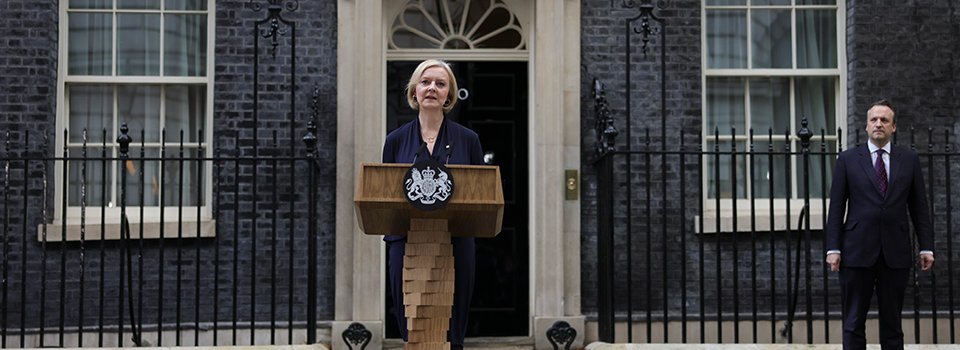| 6 mins read
In September 2022, Prime Minister Liz Truss became the UK’s latest ‘takeover’ leader, securing the post via the second route rather than the first. Remarkably, she is the fifteenth takeover since 1916 and the second woman appointed mid-term since 2016. Takeovers often get little time in power, with an average of just 3.6 years compared with an average of 6.6 years for those who came to office following a general election. However, Truss’ premiership lasted just forty-five days, far behind her closest modern comparators with 211 days (Andrew Bonar Law) and Alex Douglas Home (363 days).
As I found in my 2016 review of a century of such leaders, while replacing prime ministers who step down represents the most common way into power, takeover premierships are often difficult. The most recent takeovers are bywords for failed premierships, especially the successive takeovers of Theresa May (2016–2019) and Boris Johnson (2019–2022). Further back, Anthony Eden and Neville Chamberlain are stark warnings of quite how badly takeovers can fare. Yet, Liz Truss’s premiership was far shorter and more tumultuous even than those. What happened?
A self-inflicted crisis
Takeovers inherit the problems and crises. These can be economic, as happened with Major and Brown, or political, as when David Cameron gifted Theresa May the problem of Brexit. What makes Liz Truss different was that her crisis, unlike her recent predecessors, was self-inflicted. During the leadership hustings, Truss had repeatedly promised tax cuts and a radical break with ‘treasury orthodoxy’. It was these policies, created with ideological ally, Chancellor Kwasi Kwarteng, that immediately plunged her new government into deep crisis and controversy, from which it never recovered.
Truss’s initial action was to institute an energy price cap, which was broadly well received. However, a ‘financial event’ or ‘mini-budget’ followed, made up of an un-costed combination of tax cuts and a stamp duty cut, rush-released with little scrutiny and no analysis from the Office for Budget Responsibility, and leading to a series of financial shocks.
Truss’s fiscal event had two immediate effects, one economic and one political. First, mortgages became more expensive, as pension teetered on the brink of collapse and the pound fell in value. The IMF urged the UK to rethink ‘large and untargeted fiscal packages’, while the Bank of England was forced to step in. Second, in an echo of the poll tax, this hit exactly the homeowner voters Conservatives had cultivated. Truss’s own polling fell lower than Johnson’s when he was forced to office, while pollsters recorded record levels of support for Labour.
Truss initially rejected any change of course, calling critics ‘declinists’, before U-turning on the controversial 45 pence top-rate tax cut on the eve of her first speech to conference. After just thirty-eight days, Truss sacked her Chancellor and replaced him with Jeremy Hunt, who then reversed the entire raft of policies. By day forty-two of her premiership, the entirety of her ‘radical’ policy platform had effectively been reversed, including the energy price plan.
Radical action with brittle support
As well as crises, takeovers often inherit unhappy parties. Truss came to office aware that of the four most recent takeover leaders prior to herself, three had to face a formal leadership challenge.
Few prime ministers, and no takeovers, have dared do anything so radical with so little party support. Truss was the favourite of grassroots members, but gained the support of just 32 per cent of her MPs, less than any candidate since 1998. The party she inherited had been deeply divided by Brexit and had developed an increasing ‘taste for rebellion’ ever since. After Truss installed a Cabinet of loyalists, her already uneasy backbenches were filled with a new group of ‘the rejected, the ejected and the dejected’. This included Rishi Sunak, a possible leadership rival, as well as influential and experienced former ministers such as Michael Gove and Priti Patel. Remarkably, over her shoulder sat two former Prime Ministers.
Her mini-budget had immediate consequences for her already brittle party relationship, with MPs publicly criticising her stance and speculating about her removal. More dangerously, Conservative MPs were reportedly putting in letters of no confidence (despite the Prime Minister being safe for a year) and rumours swirled of plots to replace her with a unity candidate. On 19 October, relations finally fell apart in a bungled confidence vote triggered by Labour’s fracking ban motion, with scenes of bullying and manhandling of Tory MPs in the voting lobby.
So what went wrong? In carrying out her promises, Prime Minister Truss created a deep crisis, which fractured an already divided and unhappy party and created a policy disaster reminiscent of the poll tax or Black Wednesday. Her radical policies were done with little party support, and so both policies and party came rapidly apart. Truss entered office knowing that, of her past four Conservative predecessors in Downing Street, three faced formal removal attempts and only one, long ago in 1997, was removed by a general election. Anthony King wrote back in 1992 that Britain now had ‘over the shoulder politics’, shaped by the relationship between governments and their own backbenchers. Brexit has now accelerated and toxified this politics and Truss is the third takeover in a row to be destroyed by it.
Need help using Wiley? Click here for help using Wiley


